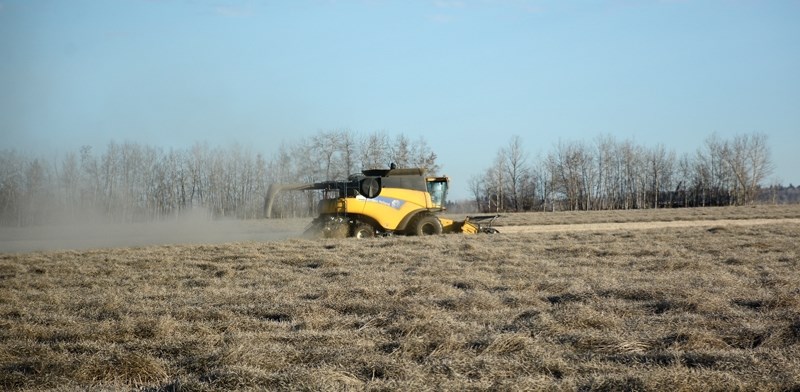Following an agricultural disaster declaration from their neighbours to the west, Westlock County is considering a similar declaration within its own borders.
Last week, Westlock County reeve Don Savage said council would ratify a declaration of agricultural disaster at a special Nov. 29 meeting, but that was later tentatively postponed until he could meet with the county’s manager of agricultural services on Nov. 28.
The ag services manager toured the northwestern region of the county last Friday and as such, Savage decided to wait for the results, which would determine whether the county fits within the protocol for an agricultural disaster. The results of that were not available by publication.
“There is a certain portion of the county that is pretty well cleaned up, but there is the west side that still has some crop left out,” Savage said.
“For some farmers, the profits are all in the fields. There are still crops that are going to be harvested but it has to get much colder, because this snow has got to be like dirt that blows right through the machine and nothing sticks to nothing. It’s got to get cold enough though.”
To the west, the County of Barrhead declared a municipal agricultural disaster at its Nov. 23 meeting, citing excessive amounts of moisture in the area. The decision was based on recommendations from the county’s Agricultural Service Board and county administration.
“I think it is important for everyone to realize that this is impacting all of us, not just the grain producers,” Reeve Doug Drozd said. “We tend to think of the canola farmers and other cereal crops first, but there is also an impact being felt by livestock producers. We have hay that still needs to be swathed, bales that are likely frozen to the ground and are, or will be, rotted soon.”
Deputy reeve Bill Lee added that his division was also struggling.
“Cattle have been brought in because we haven’t been able to do any swap-grazing and they’ve wrecked our yards as a result,” he said.
“I spent a lot of time trying to shave off the mud and make my own property manageable, filling in holes and the like, but I’ll tell you there are ruts out there that are deep enough to lose a wagon of bales in.”
Coun. Marvin Schatz agreed and noted that the county’s declaration would bring more awareness to the problem.
“I don’t think it is going to do anything for us financially, but it does paint an accurate picture of the conditions we all face.”
Province declares ag disaster
On the heels of similar declarations in Brazeau, Yellowhead and Parkland counties, Alberta Agriculture Minister Oneil Carlier declared a provincial agricultural disaster under the Fiscal Planning and Transparency Act on Nov. 22.
“The wet harvest season has been challenging for our farmers,” Carlier said. “Producers are concerned that they will not be able to harvest until spring. We take this issue seriously and our government is continuing to find ways to support our farm families.”
With the provincial declaration, the Agriculture Financial Services Corporation (AFSC) will be able to access needed funds to ensure farmers with insurance are compensated quickly. The costs will be covered by previously collected insurance premiums and won’t impact general revenues.
Producers will also be able to access Business Risk Management programs through the AFSC.
• With files from Rick De Vries



